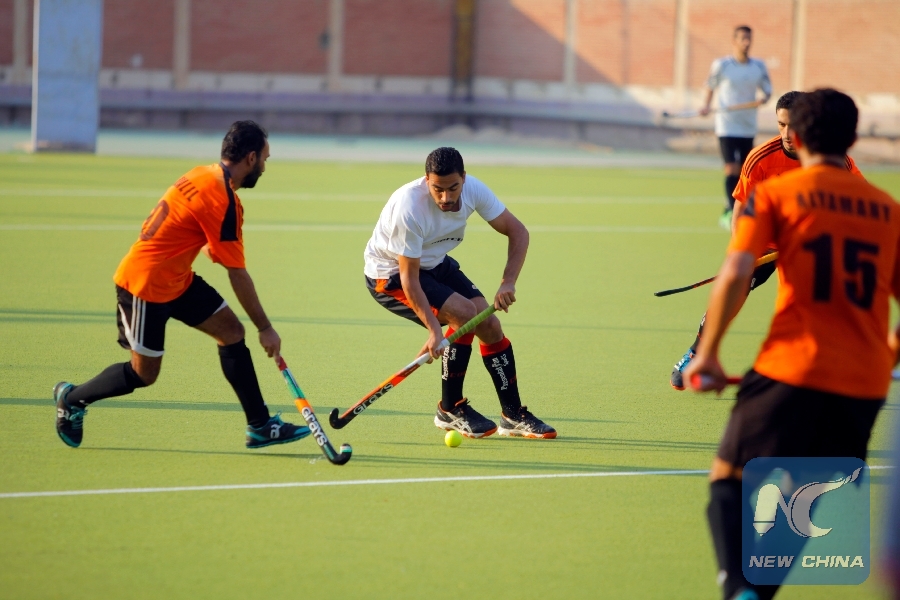 Players are seen in the hockey field in Sharqiya, Egypt, on Sept. 18, 2018. (Xinhua/Ahmed Gomaa)
Players are seen in the hockey field in Sharqiya, Egypt, on Sept. 18, 2018. (Xinhua/Ahmed Gomaa)
by Ahmed Shafiq
SHARQIYA, Egypt, Oct. 7 (Xinhua) -- Egypt's Sharqiya men's field hockey team has become the most winning team in the Arab and African countries, earning a place in the Guinness Book of Records.
Last season, Sharqiya Hockey team, which belongs to Sharqiya Club, won the local league championship, the Africa Cup of Club Championship and crowned its successful course by winning the local Super Cup last week.
"The team's history is full of Egyptian and African championships...we won 28 out of 34 national league championships," Ahmed al-Shafei, director of the team, told Xinhua.
"The team also won nine copies of the Egyptian Cup, as well as two local Super Cups," al-Shafei added.
The club entered the Guinness Book of Records as it won the 26th edition of the Africa Cup of Club Championship, marking the 23rd African win in its history and 12 consecutive African titles, a sports record in the Encyclopedia of World Sport.
Sharqiya team followed its African dream in 1988 by winning the first African Clubs Championship which was hosted in Egypt in Police Sports Association Club.
Because of this history, the team received two Sports Medals from the Egyptian Presidency. The first was in 1992 and the second in 2008. It becomes the only team to have Sports Medal in Egypt.
"The team is currently nicknamed 'Club of Century' and we are in the Guinness Book of Records because of our large number of championships," al-Shafei said.
Al-Shafei attributed the distinction of his team to the spirit of the group and the self-denial of the team players, who all come from Sharqiya province, northeast of Cairo.
He pointed out that the team includes several talented players, which gave continuity to the superiority of the team.
"Eight of our players are in the national team, and some players have already played for Italian teams," the team's director explained.
Three years ago, the administration of the club had to ban players from signing with foreign clubs in order to maintain achievements.
"Climbing to the summit is easy, but staying there is difficult, so we reject professional offers," said al-Shafei.
"In turn, we raised the categories of players and rewards, to compensate them for missing professional opportunities," al-Shafei revealed.
Speaking about the challenges his team is facing, al-Shafei complained about two problems.
"The first is the limited capabilities: the governorate is no longer supporting the team, and the Youth and Sports Ministry is supporting us partially so we resort to businessmen to get financial support," said the team manager.
Al-Shafei urged Minister of Youth and Sports to increase the financial aid he provides to the team, stressing that "the team is an ambassador to Egypt and the state should support those who make achievements."
The second problem, according to Al-Shafei, is that the team is marginalized by the media. Sharqiya Hockey Team is more famous in Africa than in Egypt.
Team player Ahmed al-Ganayni agreed with his manager, stressing that the team is suffering from a lack of financial resources and weak media coverage.
Al-Ganayni, who is a midfielder, revealed that many of the team's players have to work in the morning in government institutions and then join the trainings to overcome the poor financial resources of the club.
He also complained that hockey is not popular in Egypt, attributing this to the lack of hockey courts, which are only available in Cairo, Sharqiya, Port Said and Alexandria provinces.
Although it's not popular in the North African Arab country, ancient Egyptians played a game that is similar to present-day hockey.
Drawings on ancient tombs show players holding bats made of long palm-tree branches, with a bent end similar to that of the hockey bat.
The hockey ball was made of compressed papyrus fibers covered with two pieces of leather in the shape of a semicircle.

